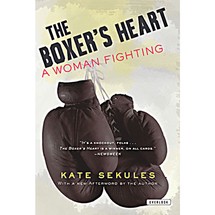Kate Sekules is not your average female boxer. Although a self-admitted tomboy, the British-born former magazine editor (she's written for
Vogue,
The New Yorker and
O) found her way to the sport circuitously—starting with an aerobic boxing class at a New York City gym in 1992. Sekules wasn't a violent person by nature, but “the first time I ever threw a punch,” she says, "I was hooked." In her memoir
The Boxer's Heart: A Woman Fighting, Sekules not only takes the reader through her journey from curious bystander to pro fighter, she delves deeply into the history of women's boxing, which was virtually unheard of in the early nineties as Sekules was starting out. For her, the women who went before her, with nicknames like "The Lady Tyger" and "The Female Ali," served as pioneers, chipping away slowly to achieve some sense of equality in the sport. This summer, 20 years after Sekules stepped into the ring for the first time, women's boxing will debut at the Olympics in London. In The Boxer's Heart, Sekules examines how her insecurities at the gym and her perception of herself as a fat girl were actually advantageous when it came to boxing—her fighting weight was considered strategic and fear of acting weak or getting hurt were motivators when sparring. She tracks her own progress in the ring—her work with trainers, her first bloody nose and pair of black eyes and her earned respect from the male boxers at Brooklyn's famed Gleason's Gym—alongside the evolution of the sport as it went from being sensationalized and sexualized to acknowledged displays of female athleticism. What is most captivating about Sekules' love letter to boxing is how she reconciles the feminine proclivity for tenderness and nurturing with their simultaneous ability to knock one another out, to unleash fury in a controlled and respectful way. One female boxer at the first ever Women's Nationals in 1997 said, "women are up against a lot more in life in general. I feel like I've been fighting a lot before." For Sekules, who admits an addiction to the thrill of boxing, it was a chance not only to believe that she herself was capable of succeeding in the ring, but it was an opportunity to kick "against a prescribed female role that restricts us," she says, adding, "I am fighting stereotypes."


